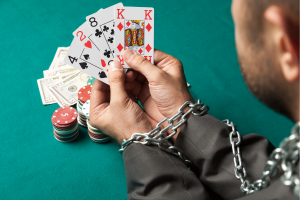Understanding Addictions

Understanding Addictions: Focus on Screen and Gaming Addictions
Addictions, whether to substances or behaviors, disrupt lives and impact mental, emotional, and physical health. While substance abuse remains a major concern, behavioral addictions, such as excessive screen time and gaming, are becoming increasingly prevalent in today’s digital age. At Manoshanti Neuropsychiatry Clinic, we specialize in identifying and addressing these issues to help individuals regain control over their lives.
What Is Addiction?
Addiction is a compulsive pattern of behavior or substance use that persists despite negative consequences. It involves a loss of control, where the individual feels unable to stop the behavior or substance use.
In the context of screen and gaming addiction, it refers to excessive use of digital devices or video games to the detriment of personal relationships, academic or professional responsibilities, and overall well-being.
Types of Behavioral Addictions
- Screen Addiction
- Excessive use of phones, tablets, computers, or TVs.
- Common activities include social media, video streaming, or browsing.
- Gaming Addiction
- Persistent and obsessive gaming, often online, with or without a competitive element.
- Associated with games that offer rewards or achievements.
Signs of Screen and Gaming Addiction
- Preoccupation: Constantly thinking about screens or games.
- Neglected Responsibilities: Ignoring work, studies, or relationships.
- Loss of Time: Hours spent on screens or gaming without realization.
- Mood Changes: Irritability or anxiety when not using screens or gaming.
- Withdrawal: Restlessness or distress when access to screens is restricted.
- Physical Effects: Eye strain, sleep problems, or headaches.
- Social Isolation: Reduced interaction with family and friends.
Causes of Screen and Gaming Addictions
- Dopamine Reward Cycle
- Activities like gaming or social media provide instant gratification, releasing dopamine in the brain, creating a “reward loop.”
- Emotional Escapism
- Using screens or gaming to avoid real-life stress, anxiety, or depression.
- Peer Influence
- Pressure to join online games or maintain a social media presence.
- Accessibility
- Easy access to digital devices increases usage.
- Design Features
- Games and apps are often designed to be addictive with features like continuous rewards, notifications, and achievements.
Effects of Screen and Gaming Addiction
- Mental Health
- Increased risk of anxiety, depression, and low self-esteem.
- Attention problems and reduced focus.
- Physical Health
- Sedentary lifestyle leading to obesity, poor posture, or repetitive strain injuries.
- Sleep disturbances due to prolonged screen exposure.
- Social Consequences
- Strained relationships due to reduced quality time with loved ones.
- Academic or Professional Impact
- Declining performance at school or work due to lack of focus or absenteeism.
Managing Screen and Gaming Addictions
- Set Clear Boundaries
- Establish specific time limits for screens and gaming.
- Create Tech-Free Zones
- Designate certain areas, such as the dining table or bedroom, as screen-free zones.
- Encourage Offline Activities
- Promote hobbies, sports, or family outings to reduce dependency on screens.
- Monitor Usage
- Use apps to track screen time and set usage limits.
- Develop Healthy Routines
- Maintain a schedule that prioritizes sleep, meals, and exercise over screen time.
- Open Communication
- Talk to individuals about the impact of their screen or gaming habits on their lives.
When to Seek Professional Help
It’s time to seek help if:
- Screen or gaming habits interfere with daily life.
- The individual becomes irritable or aggressive when restricted.
- There are signs of depression, anxiety, or withdrawal from social life.
- Academic or job performance is consistently declining.
How Manoshanti Neuropsychiatry Clinic Can Help
We offer a holistic approach to managing addictions, including screen and gaming addiction:
- Comprehensive Assessment
- Identifying patterns, triggers, and underlying psychological issues.
- Cognitive Behavioral Therapy (CBT)
- Helping individuals understand and change their addictive behaviors.
- Family Counseling
- Strengthening family dynamics to provide support and establish boundaries.
- Digital Detox Programs
- Structured plans to gradually reduce screen or gaming usage.
- Mindfulness and Stress Management
- Teaching techniques to handle stress and build emotional resilience.
- Medication (If Required)
- For cases where addiction coexists with anxiety, depression, or ADHD.
Promoting a Balanced Digital Life
Screen and gaming addictions can be managed with the right tools and support. At Manoshanti Neuropsychiatry Clinic, we empower individuals and families to regain control, build healthier habits, and improve their overall quality of life.
If you or someone you love is struggling with screen or gaming addiction, don’t hesitate to reach out. Together, we can pave the way to a balanced and fulfilling life.
Contact us today to learn more or schedule a consultation.
